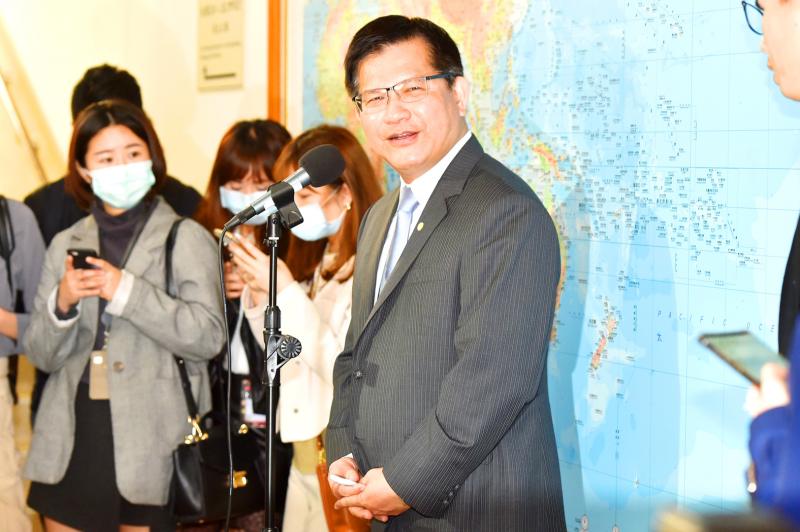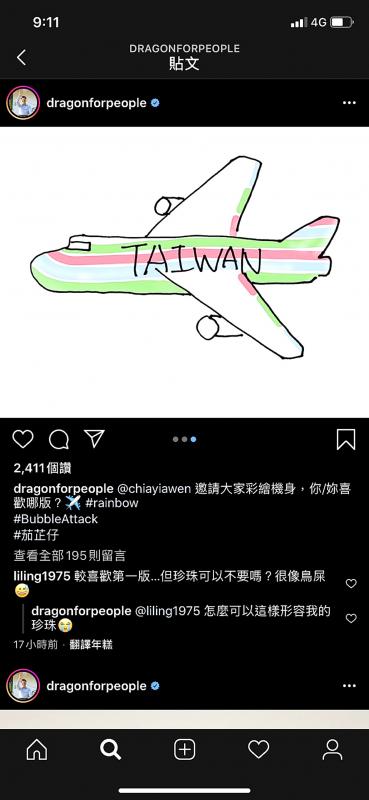The cost of renaming China Airlines (CAL) was the subject of heated debate between Minister of Transportation and Communications Lin Chia-lung (林佳龍) and several lawmakers at a meeting of the legislature’s Transportation Committee in Taipei yesterday.
Lawmakers opposed to the idea said that the name change would cost the nation approximately NT$1.1 billion (US$36.63 million), as well as the reputation the airline has built over the years.
Lin, who has said he was open to the change, was scheduled to brief lawmakers about the government’s bailout plans for airlines, transportation companies and tourism agencies hurt by the COVID-19 pandemic, but lawmakers’ questions focused on the renewed calls in the past few days to change CAL’s name.

Photo: Tu Chien-jung, Taipei Times
Chinese Nationalist Party (KMT) Legislator Hung Mong-kai (洪孟楷) asked Lin if any countries had actually mistaken Taiwan for China when they saw the banners that China Airlines hung on containers of mask donations sent by the government.
Lin said that there had been a few, but did not name them.
The Civil Aeronautics Administration (CAA) has estimated that changing the airline’s name would cost the nation at least NT$1.1 billion, Hung said as he highlighted other issues raised by agency.

Image from Lin Chia-lung’s Instagram feed
Any change in aviation pacts with other nations, including the names of airlines, would require official approval from all those involved in the pact, and delays in reaching such an agreement on a name change could have an immediate effect on the airline’s operations, CAA data showed.
Airport times slots are invaluable and CAL was able to secure good slots for in Tokyo, Bangkok, New Delhi, Los Angeles and Frankfurt, because it was grandfathered in, the agency said.
Changing CAL’s name would cause these airport authorities to reassign their time slots, which could affect CAL’s business and inconvenience its passengers, the CAA said.
A name change would also mean that the airline would have to change the names under which it is registered in the government database, those on its contracts and other documents it has signed with third parties, as well as change its code with the International Air Transportation Association, which would mean it that would have to make changes to its ticketing system and aircraft exteriors, the CAA said.
Independent Legislator Chao Cheng-yu (趙正宇) said that China Airlines has established a brand over the years and that if it changes its name, it might never be able to get the original one back.
He said he hoped that the ministry could find a good solution for the airline.
New Power Party Legislator Chiu Hsien-chih (邱顯智) cited Huang Chu-cheng (黃居正), a law professor at National Tsing Hua University, who said that CAL’s aviation rights would not be altered by a name change, but it might not be able to fly to China afterward.
However, CAL’s subsidiary, Mandarin Airlines, also flies to China and its special administrative regions, so a rebranded CAL could focus on other international destinations, Chiu said.
Another option would be for the government to establish a financial holding firm to buy CAL, with a new airline being used for all international flights other than those to China, which CAL could continue to operate, Chiu said.
Lin said the idea of a name change was nothing new, pointing to the problems that some Taiwanese have encountered with their passports going through customs in many parts of the world.
“China would oppose any change regardless of the reason. However, Taiwan does not represent China and does not want to be represented by China. For now, the government is considering changing the exterior of the [CAL] aircraft,” Lin said.
The public should discuss the issue, and could hopefully come to an agreement on the airline’s name, but the name should distinguish Taiwan from China to avoid any misunderstandings, Lin added.

Taiwan has received more than US$70 million in royalties as of the end of last year from developing the F-16V jet as countries worldwide purchase or upgrade to this popular model, government and military officials said on Saturday. Taiwan funded the development of the F-16V jet and ended up the sole investor as other countries withdrew from the program. Now the F-16V is increasingly popular and countries must pay Taiwan a percentage in royalties when they purchase new F-16V aircraft or upgrade older F-16 models. The next five years are expected to be the peak for these royalties, with Taiwan potentially earning

STAY IN YOUR LANE: As the US and Israel attack Iran, the ministry has warned China not to overstep by including Taiwanese citizens in its evacuation orders The Ministry of Foreign Affairs (MOFA) yesterday rebuked a statement by China’s embassy in Israel that it would evacuate Taiwanese holders of Chinese travel documents from Israel amid the latter’s escalating conflict with Iran. Tensions have risen across the Middle East in the wake of US and Israeli airstrikes on Iran beginning Saturday. China subsequently issued an evacuation notice for its citizens. In a news release, the Chinese embassy in Israel said holders of “Taiwan compatriot permits (台胞證)” issued to Taiwanese nationals by Chinese authorities for travel to China — could register for evacuation to Egypt. In Taipei, the ministry yesterday said Taiwan

Taiwan is awaiting official notification from the US regarding the status of the Agreement on Reciprocal Trade (ART) after the US Supreme Court ruled US President Donald Trump's global tariffs unconstitutional. Speaking to reporters before a legislative hearing today, Premier Cho Jung-tai (卓榮泰) said that Taiwan's negotiation team remains focused on ensuring that the bilateral trade deal remains intact despite the legal challenge to Trump's tariff policy. "The US has pledged to notify its trade partners once the subsequent administrative and legal processes are finalized, and that certainly includes Taiwan," Cho said when asked about opposition parties’ doubts that the ART was

If China chose to invade Taiwan tomorrow, it would only have to sever three undersea fiber-optic cable clusters to cause a data blackout, Jason Hsu (許毓仁), a senior fellow at the Hudson Institute and former Chinese Nationalist Party (KMT) legislator, told a US security panel yesterday. In a Taiwan contingency, cable disruption would be one of the earliest preinvasion actions and the signal that escalation had begun, he said, adding that Taiwan’s current cable repair capabilities are insufficient. The US-China Economic and Security Review Commission (USCC) yesterday held a hearing on US-China Competition Under the Sea, with Hsu speaking on